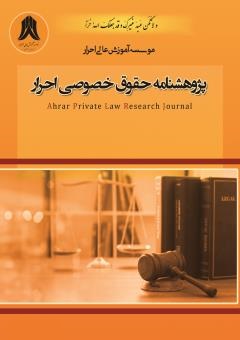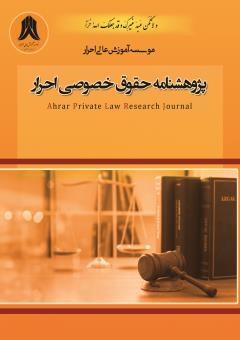The Effect Of The Global Spread Of The Corona Disease On The Tendency Of The International Arbitration System To Conclude Virtual Arbitration Agreements And Terms And To Implement The Obligations Arising From Them
Subject Areas : حقوق مدنیReza Shahidi Sadeghi 1 * , Ashraf Janati 2
1 - Phd student of private law, Department of Private Law, Faculty of Humanities, Gorgan Branch, Islamic Azad University, Gorgan, Iran.
2 - Member of the Faculty of Islamic Studies, Department of Islamic Education, Faculty of Medicine, Gilan University of Medical Sciences, Rasht, Iran.
Keywords: Virtual Arbitration, Conclusion of Virtual Arbitration Agreement, Insertion of Virtual Arbitration Condition, Execution of Virtual Arbitration Obligations, Corona Disease.,
Abstract :
Arbitration is one of the methods for the peaceful settlement of disputes in national and international disputes. In the current era, the issue of international commercial arbitration has become especially important due to the speedy settlement process and the relative reduction of dispute resolution costs, including related issues, the issue of concluding an agreement and the clause of virtual arbitration and how to performance its obligations in this space. Due to the challenges in the process of concluding traditional arbitration agreements so far, and especially with the widespread outbreak of coronary disease (Covid-2019) and the disorder in the arbitration community, it is desirable to conclude arbitration agreements in cyberspace as a non-presence agreement. Has been found to have a significant impact on the order of the world arbitration system and is a good model for improving the process of concluding of dispute resolution agreements, and in particular arbitration agreements or clauses. Advances in the field of cyberspace technology and creating a fundamental change in the field of international trade law, in particular, increasing the facility and speed of disputing traders in concluding an arbitration agreement in cyberspace and performance the obligations arising from it, the purpose of writing this article is descriptive-analytical Is written. Despite this dangerous disease and as a result, serious challenges in the effective face-to-face interaction of the parties involved in arbitration, concluding an arbitration agreement and arbitration clause in cyberspace and performance its obligations are legally permissible, but due to lack of explicit rules and regulations. In the discussion of domestic arbitrations, the rules and regulations ruling on traditional arbitration will be inforcemented.
Mafi, Homayoun, (2017), a collection of selected articles in international trade law, Tehran: Majed
Publications, second edition.
Private Law Legal Research Journal, (2012), first half year, number 1, Tehran: Shahr Danesh Legal
Research Institute (Shahr Danesh Institute of Legal Studies and Research).
Hedayati, Vahid, (2014), Arbitration in the German Legal System, Arbitration Rules of the German
Arbitration Institute and the German Arbitration Law, Tehran: Khorsandi Publications, first
edition.
Elsan, Mustafa,(2015) Requesting and Accepting Electronic Transactions, Legal Research Journal, No.
43,
Al-San, Mustafa, (2013), The place of digital signature in the electronic registration of documents, Bar
Association publication, No. 55, 2013.
Elsan, Mustafa, and Dom Yamchi, Amin,(2012), Computer nature and legal aspect of digital signature,
Legal Perspectives Magazine, No. 30 and 31.
Tavakoli, Zahra and Sadat Tabaei, Mahshid,(2014), Legal Validity of Internet Arbitration in International
Business, Azad Journal of Legal Research, Volume 8, Number 28, Summer.
Junidi, Laiya and Masoudi, Reza,(2015), a comparative study of the condition of being in writing in
electronic arbitration agreements, Comparative Law Studies, Volume 7, Number 1.
Rezaei, Ruhollah, (2019), validity of electronic signature according to domestic and international
regulations, Bar Association Monthly, Volume 53, Number 118.
Arbitration Rules, Mediation Rules,(2017), International Court of Arbitration, International Center for
Adr. Leading Dispute Resolution Worldwide. International Chamber of Commerce (ICC) 33-43
avenue du Président Wilson 75116 Paris, France. Date of publication.
Amy, J., Schmitz.(2010), University of Missoury School of Law, Drive – Thru Arbitration in the Digital
Age: Empowering Consumers through Regulated Odr. university of missoury school of Law
scholarship Repository. Faculty publications.
Bernard, H, (2000), What is Online Dispute Resolution? A Guide for Consumers (Brochure Title), ABA
Task Force on Electronic Commerce Draft March and Alternative Dispute Resolution Task.
Fayad, M., Law Graduate, kazzi, H,(2015), Professor of International Economic Law, Lebanese
University Lawyer at the Paris Bar, Electronic Arbitration in Lebanon – Overview and Trends,
Lebanese University.
Herboczkova, J., Česká Republika,(2005), Certain Aspect of online Arbitration, Právnická Fakulta
Masarykovy Univerzity.
Hosking, G and Engholm Cardoso, M., (2020), Pracyical Considerations For Holding A Remote
Arbitration Hearing, Publication forthcoming in the New York Dispute Resolution Lawyer,
Summer Vol. 13 No. 2, a publication of the New York State Bar Association Dispute Resolution
Section.
Http://Alborz.Basijlaw.ir/Story/4472/.24 October 2017.
Http://arbitration.ir/News/Details/1266/ 21 February 2022.
Katsh, E., (2000),the New Frontier Online Adr Becoming a Global Priority Dispute Resolution Magazine,
Mohamed, Abdel Wahab, S.,(2013), ODR and E-Arbitration, Trends & Challenges,.
UNCITRAL,(1988), Convention on International Bills of Exchange and International Promissory Notes,
New York, .
Uncitral, (2012), Digest of Case Law on the Model Law on International Commercial Arbitration. United
Nations Commissions on International Trade Law. New York.
UNCITRAL (1998), Model Law on Electronic Commerce with Guide to Enactment 1996 with Additional
article 5 bis as adopted in 1998.
UNCITRAL , (1985),Model Law on International Commercial Arbitration with Amendments as Adopted
in 2006.
UNCITRAL(1998), Model Law on Electronic Commerce with Guide to Enactment 1996 with Additional
Article 5 Bis as Adopted in 1998.
(United Nations Convention on the Use of Electronic Communications in International Contracts (New
York,2005))Http://Www.Uncitral.org/Uncitral/En/Uncitral_Texts/Electronic_Commerce/2005Convention.hTml. 5 December 2017.

